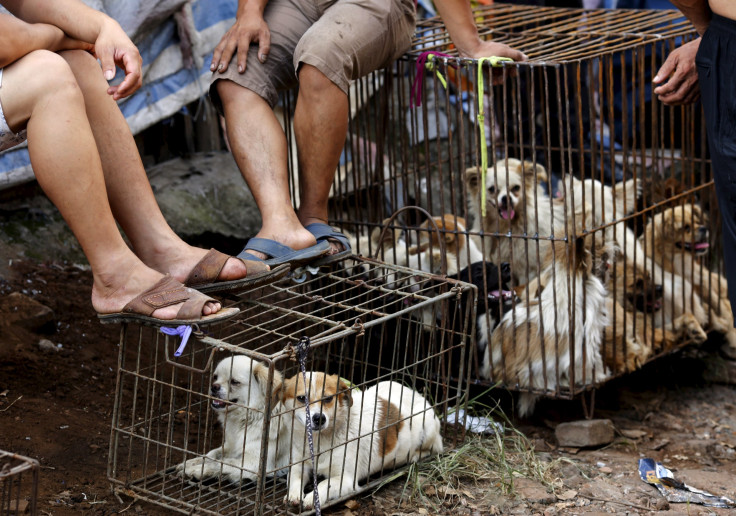Yulin Dog Meat Festival 2015: Chinese Increasingly Disinterested In Controversial Event

China’s annual dog meat festival, held every June, has drawn international criticism of the event, where thousands of dogs and cats are killed and eaten. The Yulin Dog Meat Festival, a summer solstice celebration held in southwest China’s Guangxi province, though criticized most heavily by the West, has become less popular among Chinese as well.
Eating dog meat has never been a widespread tradition in China, limited almost strictly to a few cities in southern China. Still, for those who celebrate, holding the annual festival is an important enough tradition that organizers continue to hold the event despite calls from animal rights activists and even local governments that place restrictions on the event.
On Twitter, several celebrities and animal rights groups joined in using the hashtag #StopYulin2015 to send around a petition on Change.org calling for the governor of Guangxi province to stop this year's events. The Chinese social media platform Weibo found that the Chinese general public was also on the same page. A report by the China’s official Communist Party newspaper, the People’s Daily, found that #YulinDogMeatFestival was trending on Weibo, with more than 350,000 posts opposing the event, in addition to #SayNoToYulinDogMeatFestival.
Data provided by China’s biggest search engine, Baidu, shows that interest in the festival has declined over the years. Searches for “dog meat” on the search engine have declined during the seven-day period preceding the annual event by 38 percent year on year. Similarly, searches for “dog meat festival” declined by 57 percent year on year, and other terms also associated with the event, like "how to cook it" and "when is the festival," have also declined.
Despite a general distaste for the festival, hundreds of traders gathered this past Sunday for the annual feast, where dog meat is still served traditionally with lychee fruit. Animal rights activists picketed the event and did their best to block streets, raid slaughterhouses and buy dogs that were still alive in an attempt to save them.
Though the slaughter and consumption of dog meat is not illegal in China, the decreased interest likely has to do with a couple factors: increased pet ownership and health officials speaking more outwardly of the health risks associated with consumption. A pet ownership boom in China has given way to an estimated 30 million households keeping dogs as pets, likely contributing to the festival's diminishing popularity. Rights groups say that the government has an obligation to step in and stop the festival on the grounds of health-related issues. Adam Parascandola, the director of animal cruelty issues at the Humane Society of the U.S., said in a statement that the festival is a “total breach of China’s very clear laws on animals for human consumption,” adding that ignoring them is a form of flouting national laws.
The festival in Yulin began in 2009 among the city’s dog traders. Similar events in other cities, like Jinhua, located in east China’s Zhejiang province, canceled their 600-year-old dog meat festival in 2011 after widespread criticism.
© Copyright IBTimes 2024. All rights reserved.





















